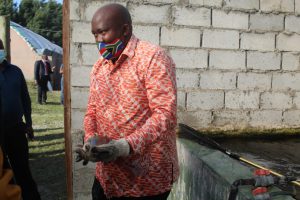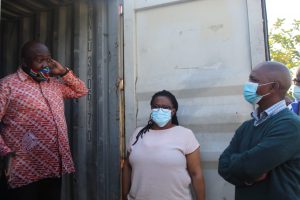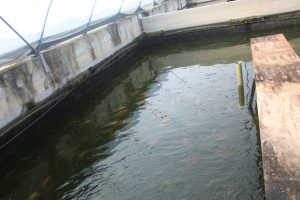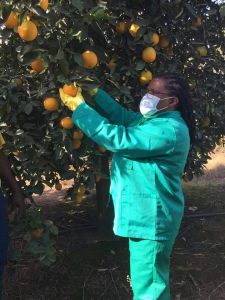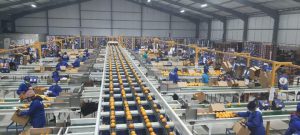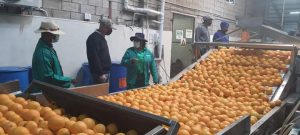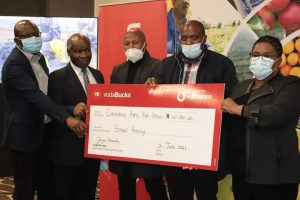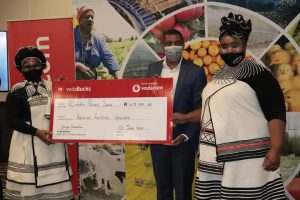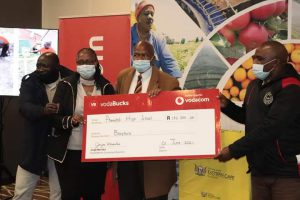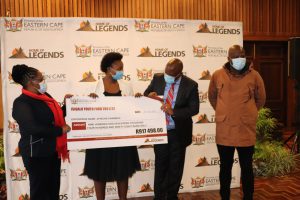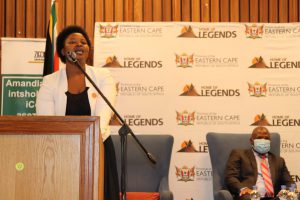
by Olwetu Batyi | Jun 25, 2021 | atp1

MEC Pieters calls for diverse farming in Eastern Cape
AMID the promising international trade channels that government is aggressively unlocking, MEC for Rural Development and Agrarian Reform, Nonkqubela Pieters encourages local farmers to broaden their scope of production and venture into the uncharted commodities.
With Eastern Cape known as the livestock capital in South Africa; wool, mohair and grain are among the commodities that have become the flagship of the province’s farming sector, including citrus.
To ensure continuous trade in almost every commodity, Pieters is calling on Eastern Cape farmers to be as diverse as possible in their farmlands so to create assortment even in investors and the market.
Putting action behind her words, this week Pieters crisscrossed the province visiting enterprises that trade in different commodities where she landed at the Port Alfred-based Lilac Holdings -Tilapia Fish farm.
Tilapia is the common umbrella name for nearly a hundred species of cichlid fish and according to co-owner of Lilac Holdings Tilapia Fish farm, Morena Khashane who is an aquaculturist, there has been a growing demand for the commodity both locally and nationally as a result of globalization and migration.
There are eight tunnels in the farm with each having two tanks inside that can accommodate a maximum of 15000 fish. Khashane and his two business partners started the business in 2019 with R5 million capital which they raised themselves. During their stint in the industry they have managed strike a deal with one of the country’s leading fish distributor.
“Pick n Pay is also one of our customers, including various fish and chips outlets in the province. But our greatest milestone so far has been supplying, Lake Harvest –a fish distributing company that operates in Gauteng but distributes across the country said Khashane.

The black-owned fish farm doesn’t breed its own fish at the present moment but buys finger links in Makhanda (Grahamstown) at a weight of about 2kg and grow them for a period of six months in their tanks under the recirculated water system.
However, as much as the demand for their produce is high, there are challenges that weigh the business down which Khashane shared with Pieters. Most of these are infrastructural.
“So far we have sold more than 30 000 fish and we can’t meet our customers’ demand because our infrastructure doesn’t allow us.

We are in a dire need of operating inputs. The business can take care of the rest of its needs because even the water we are using here is from our boreholes,” said Khashane.
The farm also assists the Ndlambe Local Municipality with water from its borehole.
With the international trade company, Al-Mawash showing interest in various locally produced food, great opportunities await Eastern Cape farmers in the industry.

by Olwetu Batyi | Jun 23, 2021 | atp1

Weather favours Sunday’s River Valley citrus growers
WHILE majority of farmers of various job commodities complain about the effects of the current climatic status which are largely contributed to global warming, citrus growers in the Sunday’s River Valley Local Municipality are singing a different tune.
The area has experienced less gust so far in the year compared to past years and citrus growers in the area have become the few if not the first producers in the farming sector to express delight and fulfilment in the current environmental conditions.
To them less blowing winds guarantee high quality yields with reduced leave marks on their fruits. Leave marks are caused when leaves and fruit rub together and at times bounce to each other from being blown by wind.
This is the story of Sikhula Sonke Enterprise that manager, Buyiswa Ndyenga expressed with a wide smile to MEC for Rural Development and Agrarian Reform, Nonkqubela Pieters.

After having led a harvesting session in the Upper Kat Citrus growers two weeks ago in the Amathole District, Pieters continued her tour to Kirkwood, Sarah Baartman District in a move solely aimed at developing the sector further. The developments mean improving farmworkers’ working conditions, catapulting new entrants and penetration of the market.
“Citrus, wool and mohair are some of the economic corridors in the area and while we explore other avenues, let’s continue to build a formidable sector in all respects. This means we need to be primary, secondary and tertiary producers so to add value in our resources. But in order for us to continue lifting the country’s flag high in the commodity (citrus) we need to work together and align our visions and plans,” said Pieters.
She said the government’s plan was to strengthen the already thriving sector by allowing new entrants opportunities to scale up and participate meaningfully in citrus production.
“The future belongs to the young and fresh. That is why even you as farmers keep planting new trees when the old ones can no longer bear fruits. It is that reason that even in the farming sector we want create a create a conducive environment that will allow young people to thrive in their province not elsewhere because our precious resource in the Eastern Cape is farmland,” she said.
Citrus producers in the Sunday’s River Valley Local Municipality are among the top employers with more 4000 workers.
Relaying their story as Sikhula Sonke Enterprise, Ndyenga said under the enterprise they have five farms. Four of the farms are leased from DRDAR and the growers bought a fifth farm from their profits to extend their orchards to 378ha.

Sikhula Sonke Enterprise employs 568 seasonal workers, 57 permanent staffers and 11 managers. The Willowtree Farm which Pieters joined the harvesters on the orchards employs 96 seasonal workers and 17 permanent workers.
The woman-led enterprise was established in 2007 and has 12 direct beneficiaries. Sikhula Sonke Enterprise has been working closely with the Sunday’s River Citrus Companies and DRDAR. From its inception, DRDAR aided Sikhula Sonke with tower spray machine (3000lt), citrus bins and production inputs while the Sunday’s River Citrus Companies provides technical support, upskilling of the beneficiaries and workers also production process of the fruit from planting of trees to packaging of the fruit.
Sikhula Sonke through SRCC sells their fruit in 32 countries across the globe including China, Russia, Middle East and
they benefit in the direct marketing and sales relationship of local retailers such as Pick n Pay, Shoprite, Checkers and Woolworths.
Dyenga said this season’s harvest guarantees them high margins that could translate to more permanent jobs if the weather conditions continued to be in their favour.

by Olwetu Batyi | Jun 22, 2021 | atp1

Upper Kat citrus growers anticipate growth in citrus industry
THE Upper Kat citrus growers are foreseeing a tremendous growth in the citrus commodity as this industry is the economic driver in the area.
Upper Kat citrus growers yielded and marketed a total of 576114 cartons of fruit in the past season.
The group is made of 17 black growers and one white farmer within the Amathole District who grow their fruit on a 400ha piece of land and export a large chunk of it to international markets.
Last year they raked in a combined bottom line of R94 869 136 on both exports and local sales.
Today [June 12, 2021] MEC for Rural Development and Agrarian Reform, Nonkqubela Pieters led the citrus harvesting.

These farmers create jobs for more than 1000 locals with majority of the jobs being seasonal whilst the department placed young people(unemployed graduates)in some of these farms for experiential learning and mentorship in 2019/20 -20/21 paying market related stipend Pieters also engaged farmers on how her department can help them soar to greater heights.
“This area is known as the citrus belt of the province and it has great potential. Government alone can not create jobs but creates a conducive environment for businesses like yours to expand, create jobs and have a meaningful contribution in the country’s economy ” said Pieters.
Key challenges raised by farmers were infrastructure , title deeds and debts that were supposed to be written off but the progress is very slow.
Athol Trollip of South African Fruit Promoters who has been helping the farmers to secure funding after being rejected by banks as they don’t have title deeds said the Upper Kat citrus growers were on the right track ,their produce is of good quality and them getting title deeds will unlock all the bottlenecks in securing commercial funding.

“We are very grateful for the support that government continues to provide and we have also helped many of the farmers to secure loans so that they could purchase fresh trees as some of the farms had old trees that were no longer productive. The trees have now beard their first fruits and if this is replicated, the farmers will be able to produce more and finally break even. As we know the
demand for Vitamic C continues to rise under the covid 19 strain and the performance of the
industry is very good .In the next three years we expect our turnover to go from R96 million to R120 million,” said Trollip.
In response MEC Pieters committed that her department will liaise with National department of Agriculture, Land Reform and Rural Development through the Acting Head of Department, Mr Bongikaya Dayimani to speed up the process of title deeds and there will be further engagement with these farmers and other stakeholders that are active in the citrus commodity as close monitoring is essential to ensure that government realize the gains of the financial investments made.
Among the producers is 33 year old Siyabonga Ndzoyi of Gatyena Farm who operates on a 32. 578 ha farm with 16.9 ha under production exported 12 678 cartoons in 2020 and sold 1378 cartoons for local markets with more than R1 million in revenue.
He is also looking for more land so he can grow his production and create more jobs.
The farmers’ produce is prepared and packaged at the local Eden Agri Services pack house in Fort Beaufort before it is shipped to international markets.

by Olwetu Batyi | Jun 6, 2021 | atp1
Efforts to instil an agricultural mindset in learners
By Thozi kaManyisana
MEC for the department of Rural Development and Agrarian Reform (DRDAR) Nonkqubela Peiters hailed the relationship and partnership between private sector and government as “milestone in the development of rural people.”
Speaking during the award ceremony held in Mthatha for schools that are practising agriculture in the province, the MEC said the partnership between Vocadom, departments of education and DRDAR and commitment of OR Tambo District Municipality “completes” the district development model (DDM) where all spheres of government and private sector work together to support communities.
The sustainable living competition seeks to promote agriculture in schools as part of food security. It is also meant to build an agricultural foundation among learners More than 200 schools have participated so far.
“This partnership completes the DDM and is indeed the milestone in the development of rural people. If all spheres of government spheres are working together, it becomes easier for the private sector to invest and be part of the developmental programme,” the MEC said.
“It is befitting to award the schools today on the first day of June because we are paying homage to the Class of 1976 that led us to be free today. We need to walk the talk by coming up with the programmes that encourage youth.
“You cannot have a healthy mind in an unhealthy body hence the learners need to take this subject seriously and we need to work together with education department to ensure agriculture is taken seriously.”
MEC Pieters said government appreciates the work done by the private sector in supporting development, adding that Vodacom has come up with “a brilliant initiative that is appreciated because if you focus on education you are developing the country and the continent.”
OR Tambo District Municipality Mayor Thokozile Sokhanyile said: “Agriculture for rural communities is essential and if we start at school level, it will be massive hence as the municipality we will have a team that will be part of this initiative working directly with the Mayor’s Office,” she said.
Vodacom provincial managing executive Mpumelelo Khumalo praised the officials of DRDAR, who he said they have “worked hard together to ensure school kids are knowledgeable about producing food.
“It is fulfilling to work with government and as a private sector, we have a pivotal role to play because I believe as a collective we can do more. Our team is passionate about working with government and the good health and wellbeing of children is critical in the education hence this programme is close to our hearts,” Khumalo.
Committing Vodacom to continue to work with government, he said the introduction of technology in agriculture that includes access to markets or weather trends at the fingertips was “very essential to make agriculture smarter and the partnership with government is the pillar to drive the social development in our country.”
Department of Education director for school landscape management, revitalisation and rural education Amos Fetsha said at least 131 schools had participated in the programme where they seek to “instil and foster love for agriculture” from a young age through food gardens.
He said DRDAR came with its technical expertise and “brought light to the programme” where Vodacom supplied gardening tools and seedlings.
Vodacom has also supplied a first prize of a borehole, a second prize with revamping ablution facilities and DRDAR provided fencing as a third prize.
“We want to educate the nation about the importance of agriculture in economic growth and also the career of choice to young people,” he said.

by Olwetu Batyi | May 24, 2021 | atp1

Financial breakthrough for young cannabis farmer
THE Eastern Cape government ,through its Isiqalo Fund meant to boost youth owned businesses in a bid to fight unemployment and poverty today handed over a cheque of R917 498 to a young cannabis farmer from the Nelson Mandela Metro.
Zozo Tshaka (33) is one of a few black youths who are licensed cannabis farmers in the countr. Tshaka is venturing into cultivation and agroprocessing of the cannabis plant.
Today, Premier Lubabalo Mabuyane and Eastern Cape Department of Rural Development and Agrarian Reform MEC Nonkqubela Pieters officially handed over the cheque to an elated Tshaka during the Preimer’s post SOPA engagements in the city.
The Gqeberha resident started off with an accounting degree at the Nelson Mandela University but switched to agriculture which she believed was “gold”.
She said she has been pursuing her cannabis business doing research on CBD oils and production and explore primary and secondary production of the commodity.

Upon receipt of the cheque, Tshaka couldn’t not contain herself, “I am so grateful for this fund as I took a step of faith leaving my profession starting something believing that it is gold”.
Her farming activities will be conducted in Elands Rivier in Uitenhage.
